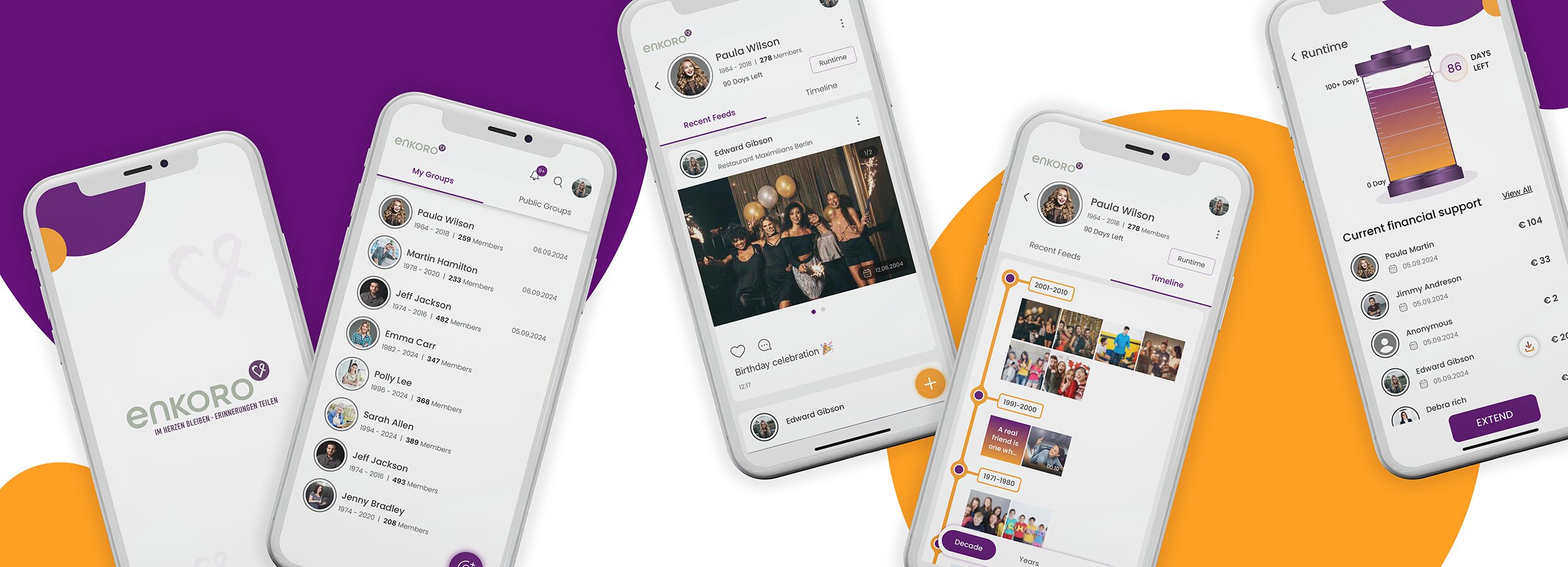Help with grief
The loss of a loved one is a profound and painful experience that changes our lives forever. Grief is a complex and individual process that requires time, patience and understanding. However, there are numerous ways to find support and cope with grief. This detailed guide looks at various options, professional help and institutions that can assist you during this difficult phase. We will also look at the importance of memory care and the use of digital tools, such as the ENKORO app.
The stages of grief: a complex process
The grieving process is not linear and is different for every person. There is no fixed order or duration. Common phases include shock and numbing, denial, bargaining, anger, depression and finally acceptance. These phases can overlap, repeat and occur in varying degrees of intensity. It is important to realize that every reaction to the loss is legitimate and that there is no “wrong” way to grieve. It is completely normal to experience different emotions at the same time, to fluctuate between hope and despair.
Support in the personal environment: the network of social relationships
The support of friends, family and acquaintances is often the first and most important anchor in grief. A sympathetic ear, empathetic words, simply being there – these gestures can mean an enormous amount. Practical help in everyday life, such as with household tasks, childcare or errands, relieves the burden and gives you valuable time to process your grief.
However, it is important to note that the environment is not always able to fully meet the need for support. It can be helpful to talk openly about your needs and limitations and to make it clear to your loved ones what kind of support you need. Accepting help is also an important step in the grieving process.
Professional help: Individual support during mourning
If the grief becomes too intense or it is difficult to deal with it over a longer period of time, professional help is essential. Various specialists can offer support here:
- Bereavement counselors: These specially trained professionals offer a safe space to share feelings and thoughts. They help you to understand the grieving process, develop individual strategies for coping and activate resources. Grief counseling can take place both individually and in groups. Groups offer the advantage of sharing with other affected people and the experience of not being alone with your grief.
- Psychotherapists: In the case of a complicated grief reaction, post-traumatic stress disorder or other psychological problems, the support of a psychotherapist is advisable. Various therapeutic approaches, such as cognitive behavioural therapy or psychodynamic therapy, can help to process traumatizing experiences and learn new coping strategies.
- Chaplains: Chaplains offer spiritual support and comfort. Regardless of denomination, they can listen empathetically, open up spiritual perspectives on the loss and provide support in the search for meaning and stability.
Institutions and organizations: A comprehensive support network
Numerous institutions and organizations offer comprehensive grief support:
- Hospices: Hospices not only provide comprehensive support for the dying, but also for their relatives. They offer grief counseling, advice, bereavement groups and information events. These services are available in both inpatient hospices and outpatient hospice services.
- Outpatient hospice services: These services provide palliative care and support for dying people and their relatives in the home environment. They also offer grief counseling and supportive measures.
- Bereavement groups: Bereavement groups allow people to share their experiences with others who are affected. In a protected environment, experiences can be shared, feelings can be expressed and strategies for coping can be developed together. The exchange with people who have had similar experiences can be enormously relieving and comforting.
- Self-help groups: Self-help groups offer a supportive environment for people with similar experiences. They offer the opportunity to exchange ideas with others, develop strategies together and learn from the experiences of others.
Digital support: preserving and sharing memories with ENKORO
The digital world offers new ways of preserving memories of the deceased and keeping in touch with other mourners. The ENKORO app allows you to collect and share photos, videos, documents and other memories with friends and family. This digital memorial can be an important part of coping with grief and helps to maintain a connection with the deceased. It makes it possible to share positive memories and cope with grief together.
Important tips for dealing with grief
The grieving process is individual and requires patience and self-compassion. There is no right or wrong way to grieve. Here are some important tips:
- Allow yourself to grieve: do not suppress your feelings. It is important to allow yourself to grieve and give it space.
- Be patient with yourself: The grieving process takes time. There is no predetermined duration or “right” way to grieve.
- Seek support: Don’t hesitate to accept help if you need it.
- Take care of your physical and mental health: a balanced diet, sufficient sleep and regular exercise support the grieving process.
- Remember in your own way: Find rituals and ways to commemorate the deceased that give you personal comfort.
- Nurture your relationships: Keep in touch with friends and family who can give you support.
Grief is a complex process that takes time and support. Take advantage of the many options available to you to help you cope with this difficult time and find a way to live with the loss.
#grief #grief management #grief support #loss #death #memories #ENKORO #grief counseling #psychotherapy #hospice #grief process #support group #grief groups #digitalmemory #memory app





